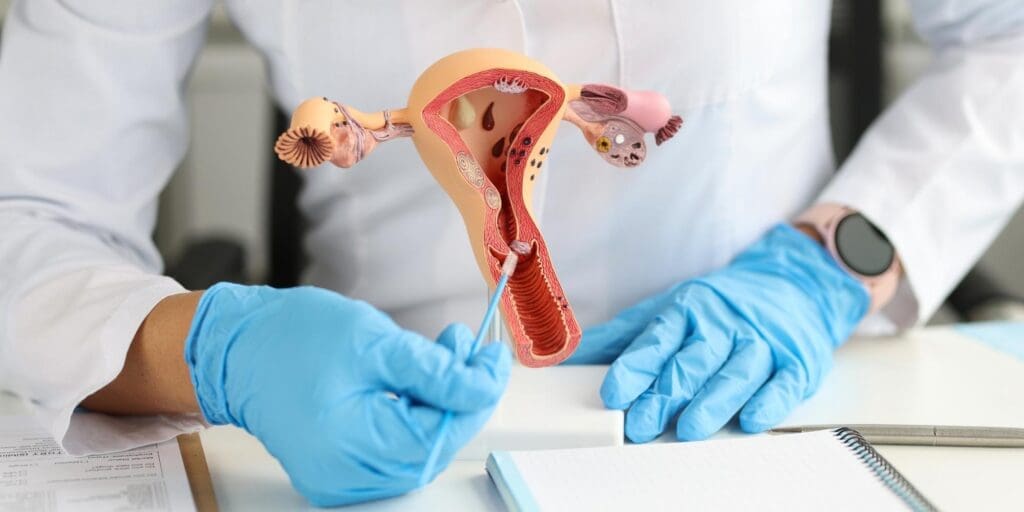Polycystic ovary syndrome (PCOS) is a condition that affects a person’s hormone levels. People with this condition have higher levels of the hormone androgen which is typically found in males. This hormonal imbalance causes their body to skip menstrual periods and makes it harder for them to get pregnant.
PCOS also causes several other symptoms, mainly hair growth on the face and body and acne. It can also contribute to more long-term health issues like heart disease and diabetes.
To better understand PCOS, here’s everything you need to know about the condition, from what it is, what causes it, and how it’s treated.
What Is Polycystic Ovary Syndrome?
Polycystic ovary syndrome, more commonly known as PCOS, is a hormonal condition that affects the ovaries, typically during the childbearing years (ages 15-44). People with PCOS may have infrequent or prolonged menstrual periods or excess male hormone (androgen) levels.
The name polycystic ovary syndrome describes the numerous small cysts (fluid-filled sacs) that form in the ovaries. However, some people with this disorder do not have cysts, while some people without the disorder do develop cysts.
Ovulation occurs when a mature egg is released from an ovary. This happens so that it can be fertilized by a sperm. If the egg is not fertilized, it is shed from the ovaries and out of the body during the menstrual cycle.
In some cases, a person doesn’t make enough of the hormones needed to ovulate. When ovulation doesn’t happen, the ovaries can develop many small cysts. These cysts create androgens, which can cause problems with a person’s menstrual cycle, and causes many of the known symptoms of PCOS.
As the name suggests, PCOS is a “syndrome,” or group of symptoms that affects the ovaries and ovulation. Its three main features are:
- Cysts in the ovaries
- High levels of male hormones
- Irregular or skipped periods
The exact cause of PCOS is unknown. Early diagnosis and treatment along with weight loss may reduce the risk of long-term complications such as type 2 diabetes and heart disease.
Symptoms of PCOS
Signs and symptoms of PCOS oftentimes develop around the time of the first menstrual cycle during puberty. In some cases, PCOS can develop later in life, typically as a result of things like weight gain or health conditions.
Like many other conditions, symptoms of PCOS can vary from person to person. With that said, a doctor will typically diagnose PCOS when you experience at least two of the following signs:
- Irregular periods: Infrequent, irregular, or prolonged periods are by far the most common sign of PCOS. Irregular periods are often categorized as having fewer than nine periods a year, having more than 35 days between periods, or having abnormally heavy periods.
- Excess androgen levels: Androgen is a male hormone that is not commonly found in high levels among people with uteruses. Elevated levels of these hormones may result in physical signs, such as excess facial and body hair (hirsutism), and occasionally severe acne and male-pattern baldness.
- Ovarian cysts: The name polycystic translates to many cysts. If you have PCOS, your ovaries might be enlarged and contain follicles that surround the eggs. As a result, the ovaries might fail to function regularly.
Other common symptoms of PCOS include:
- Darkened skin
- Excess skin (skin tags) on the neck or in the armpits
- Mood changes
- Pelvic pain
- Weight gain
- Headaches
What Causes PCOS?
Doctors and medical experts don’t know what exactly causes PCOS. Some believe that the high levels of androgen prevent the ovaries from producing hormones and making eggs properly. Others believe that genetics are to blame, citing that PCOS tends to run in families.
What is known about PCOS is that genetics, insulin resistance, and inflammation have all been linked to excess androgen production.
One study found that nearly 70 percent of people with PCOS have insulin resistance, which means their cells cannot properly use insulin. Insulin is a hormone that helps your body use the sugars you get from foods. When your cells become unable to use insulin properly, your body’s demand for it goes up. As a result, your pancreas makes more insulin to compensate. Extra insulin triggers the ovaries to produce more male hormones.
Many individuals with PCOS also report having higher levels of inflammation in their bodies. Obesity and excessive weight gain can also contribute to increased inflammation. Studies have shown that higher levels of inflammation can cause an increase in androgen levels in the body.
Who Gets PCOS?
It’s estimated that between 2.2 and 26.7 percent of people have PCOS. While many people have PCOS, the overwhelming majority are unaware they are living with the condition. In fact, one study published in 2009 found that nearly 70 percent of people with PCOS hadn’t been diagnosed.
While it may be difficult to know if you have PCOS, several major risk factors can help you determine if you are at risk. These factors include:
- Type 1 and type 2 diabetes
- Gestational diabetes
- Insulin resistance
- Obesity (nearly 80 percent of people with PCOS have obesity)
- Hypertension
- Dyslipidemia
If you believe that you may be at risk for PCOS, or if you are experiencing any of the above-mentioned symptoms, it may be time to speak with your doctor.
Diagnosing PCOS


Your doctor will likely also ask you about other symptoms that typically accompany PCOS. These typically include symptoms like acne, facial and body hair growth, and sudden or excessive weight gain.
In many instances, your doctor may suggest a pelvic exam to help look for any problems you may have with your ovaries or other parts of your reproductive system. During this test, your doctor inserts gloved fingers into your vagina and checks for any growths in your ovaries or uterus.
Blood tests can also be used to help check for higher levels of androgen. They can also help check your cholesterol, insulin, and triglyceride levels to evaluate your risk for other conditions like heart disease and diabetes.
Once your doctor has confirmed a PCOS diagnosis, the next step is to determine what treatment option is best for you.
Treating Polycystic Ovary Syndrome
Several different medical treatments are commonly used to treat PCOS. These treatments are all aimed at helping regulate the menstrual cycle and treat PCOS symptoms like acne and hair growth.
Birth Control
Progestins are synthetic forms of the body’s naturally-occurring hormone progesterone. This means that they do some of what the body’s natural progesterone does. For instance, progestins can cause changes to the endometrium (the lining of the uterus) that prevent it from proliferating (building up) too much. This can help it support implantation and the continuation of early pregnancy.
Taking progestin daily can:
- Regulate ovulation
- Relieve symptoms like excess hair growth
- Protect you against endometrial cancer
- Restore natural hormone balance
You can take progestin via a pill, patch, or vaginal ring. Your doctor can help you determine which of these delivery methods is best for you.
Metformin
Metformin is a drug that is typically used to treat type 2 diabetes. While this may be its primary use, one of the major signs of PCOS is insulin resistance. Thus, metformin also treats PCOS by improving insulin levels in the body.
One study, published in 2015, found that taking metformin alongside diet and exercise improved weight loss, lowered blood sugar, and helped restore a regular menstrual cycle.
Clomiphene
Clomiphene is a commonly prescribed fertility drug that has been shown to help people with PCOS get pregnant. Between 70 and 80 percent of women with PCOS have fertility problems. PCOS can also increase your risk for pregnancy complications like miscarriage or an early loss of pregnancy.
While clomiphene has been shown to help people with PCOS, it should be noted that the drug does increase the chances of twins and other multiple births.
Surgery
While not common, surgery can be an option for people with PCOS who wish to improve fertility should other treatments fail. A procedure known as ovarian drilling makes tiny holes in the ovary using a laser or thin heated needle to restore normal ovarian function.
As with any surgical procedure, ovarian drilling does carry risks, so it’s also important to talk with your doctor to understand whether this procedure is right for you.
Have You Heard of Polycystic Ovary Syndrome?
Let us know in the comments below!
What topics related to polycystic ovary syndrome should we cover next?
Email us your ideas at info@painresource.com!
Are you or someone you know living with polycystic ovary syndrome? Looking for a support group?
Join the Pain Resource Community today to start building your support network!





While switching doctors during a move overseas, I noticed I had been diagnosed with PCOS – but the possibility had never been discussed! Later discussions with my gynecologist showed I do not have it. So instead of fighting for a diagnosis, I got the opposite.
I think chronic pain and some of the diseases that cause it (in my case, CFS/ME) can bring about the same symptoms. A multi-systemic, chronic condition will affect insulin resistance and hormones, which can in turn cause problems with period frequency and mood swings. Because you are less active due to fatigue, weight gain is a common occurrence. Acne can be as well. Abdominal pain is frequent with my condition as well, which could be caused by gastric pain or rupturing ovaries. Just looking at a person, a medical professional might jump to the conclusion that they have PCOS.
This is a well put together article. I know at least two women who have the condition, and I’ve seen how awful it can be. Both suffer pain and I’ve seen how a dismissal of that pain from the medical community has made their lives worse. Add to that the wish to get pregnant, and it’s a sad situation all around.